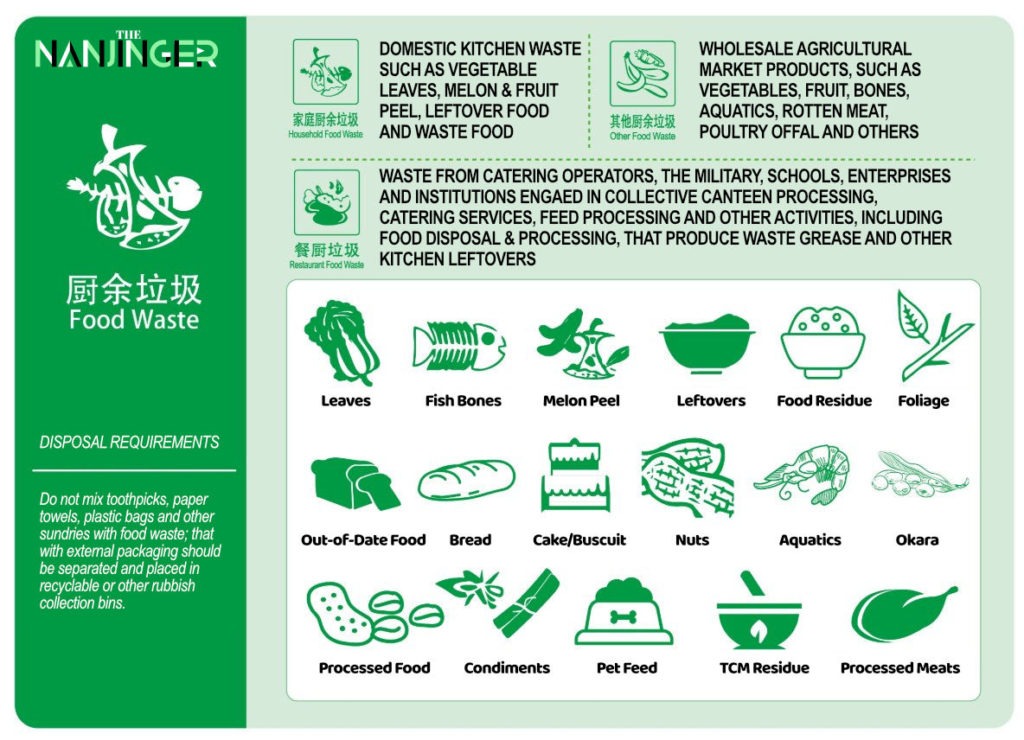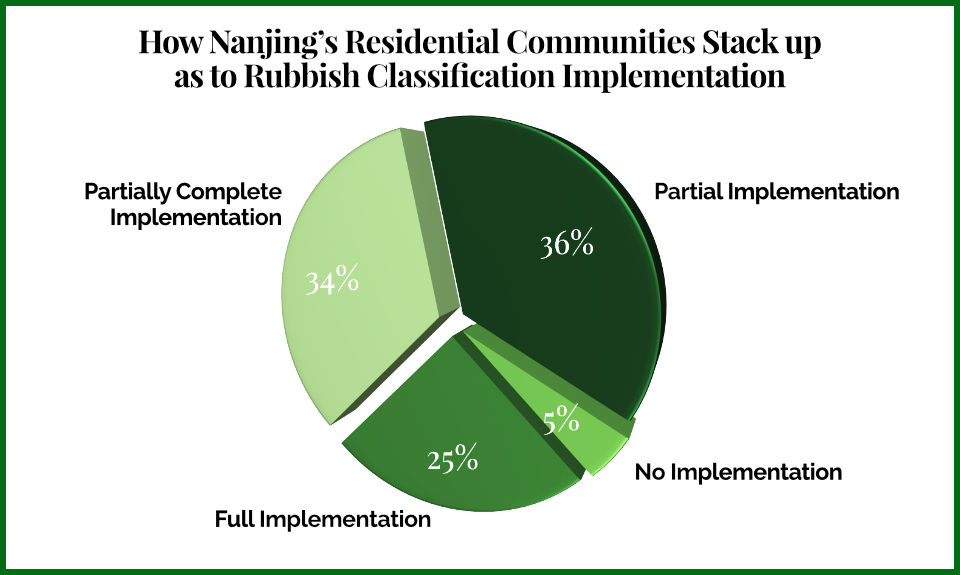With it being almost 3 months since Nanjing implemented rubbish classification, The Nanjinger figured it was time for a check up on our fair city’s progress as to environmental protection efforts in the field. Turns out there is still quite some work to do.
Implemented on 1 November, 2020, were the “Regulations on the Management of Domestic Waste in Nanjing”. In the weeks and months leading up to the policy introduction, numerous efforts were enacted across society in an attempt to prepare the populace for the incoming legislation.
To access the effectiveness of these measures, The Nanjinger has in the past 24 hours surveyed a large number of local people and foreigners, living in a cross section of Nanjing’s administrative areas, the thinking being different parts of the city may have adopted the measures to a lesser or greater extent.
The results of the survey make for an interesting snapshot as to how well our city has lived up to the government’s expectations. In addition, scattered throughout this report are English translations of Nanjing’s four official rubbish classification guides, for namely food waste, recyclable waste, residual waste and hazardous waste. Readers are free to use these guides as they wish.

A special mention should be made of face masks, which oddly do not appear on any of the recycling guides. They are, however, mentioned in an official post from Qinhuai District Fusion Media Centre, which states that the correct method of disposal is to place the mask in a plastic bag before depositing it as residual waste.
Survey on Nanjing’s Adoption of Rubbish Classification
First, kudos to the communities who scored an “A” in The Nanjinger’s survey, defined as having fully implemented the government’s rubbish classification policy, with purpose-built facilities put in place. In no particular order, they are:
- Zhongshan Meilu (Qixia)
- Royal Family Garden (Qixia)
- Yuke Meidi (Jiangning)
- Fengshan Xin Chen (Yuhuatai)
- Minghua Xin Cun (Gulou)
- Jinmao Garden (Gulou)
- Tongxin Community (Pukou)
- Huaqiao Lu (Gulou)
- Rongtai Villa (Qinhuai)
- Yangshan Lake Garden (Qixia)
- Xiangxi Yueyuan (Qixia)
All in, communities given an “A” for their classification efforts account for a reasonable 25 percent of survey responses. That’s the good news.
Then there are communities ranked as “B”, those that have partially completed implementation, by for example repurposing, repositioning and clearly labelling existing bins. These are joined by those ranked as “C”, which have attained partial implementation, merely by labelling existing bins.
In The Nanjinger’s survey, 34.1 percent of communities were given a “B” and 36.4 percent a “C”.
Only 4.5 percent of survey respondents gave their community a “D”, for no rubbish classification whatsoever.
As to the theory that different districts of Nanjing might perform better than others, it appears Qixia and Gulou districts have implemented the new government policy significantly better than other parts of the city.
Nanjing Rubbish-Classification Survey Analysis
It is worth remembering that for many people, the very concept of separating waste according to type is a new idea indeed. As such, authorities in Nanjing were keen early on to put the emphasis on education. But the impact of such has so far been quite limited.

Among those completing the survey was Nicole Zhu, who lives in Jinwangfu Community in Jiangning District. “Generally most of us, especially young people, take a positive attitude at this, although some of the senior grandma and grandpa may feel a little confused, since they know little about to which category the rubbish belongs”, she said.
“Training and education are necessary, especially for elder people. And more volunteers are needed to teach people which bin is the right one. When we completely know how to deal with rubbish, we will enjoy a better living environment.”
But the elderly also have a tendency for attention to detail. Jennifer Yang, who lives in Tianhong Villa in Qixia District, says, “Even I see that many elderly people are doing a good job in this area, and they sort household rubbish very carefully, learning the attributes of different rubbish”.
While many local people are taking to rubbish classification with enthusiasm, so a proactive approach by community management can also make a significant difference.

Carrie Cao lives in Minghua Xin Cun of Gulou District, one of those which was given an “A” for their rubbish classification. “Every morning and evening, someone from the community will lead us to abide by the rules of rubbish classification and help to solve problems. So everyone around me takes a supportive attitude”, says Cao.
That kind of user-management interaction appears also to be a key driver of take up. Helmut Güsten lives in Xiangxi Yueyuan of Qixia District, another compound that has been rated as “A” in their rubbish-classification implementation. He says, “The purpose built facilities operated with dedicated user card are in place, but they only allow ‘other waste’ and ‘food waste’. Dangerous and special waste continues to be dropped in a red bin next to the system. The recyclable rubbish has another, blue bin, but the staff of the community ask us to place this rubbish in front of the actual bin”.
While support for the public effort is one solution, policing is another. Another foreign man, preferring to be unnamed and living in Pukou District in the “A”-rated Tongxin Community, said, “The people in the apartments where I live all recycle their rubbish. They do not get much choice in the matter as the bins are ‘guarded’ by people who check what is being thrown away, and into which bin”.
That element of choice of course varies hugely from person to person and place to place and Nanjing is in no way unique.
Harold Wang, who lives in Tielubeijie Community of Gulou District, compared Nanjing to Europe, having lived in Finland for 6 years. “In Nordic countries where rubbish classification has been implemented for decades you see people, especially foreigners, doing it poorly. So it requires continuous effort from the government and community to really implement them”, he said.

Here in Nanjijng, however, it would appear foreigners are a more conscientious bunch.
Kirke Maier lives in Royal Family Garden in Qixia District, a compound with a very high concentration of foreign families. “Generally people welcome the change, as many residents here support the efforts to recycle as much rubbish as possible. Although it causes some inconvenience, as the rubbish stations are at each end of the compound, so quite far away from some residents. It is a good incentive to take a daily evening walk to dispose of rubbish”, she said.
For some, however, that evening stroll is less of an inconvenience and more of a hassle. Alert reader, Nadja Vetter, who lives in Evian Valley of Qixia District, reports for her it is a 20-minute round trip. And when she gets there, she says, “Whom do I get to see at the drop-off point? Other foreigners; sometimes an ‘ayi’ stopping by on her way home”.
But Vetter raises another issue which appears also to be a trend. “It turned out quickly that the new layout wouldn’t work; that most people would not bother to change their habits and get into a new routine. All kinds of trash is still piling up on the former spots, where the old bins used to be, or even dropped randomly”, she said.
At the Tuolejia Community in Jiangning District, the problem is such that management this morning stuck a notice on former bin sites, stating, “Rubbish bins have been removed from this area. Please go to the designated rubbish drop-off point”. Less politely and behind closed doors, the talk is of the ¥200 fine for those who fail to comply with the new regulations.
There is certainly no shortage of those not in favour. Speaking on the condition of anonymity, a foreign resident in Jiangning District’s Xiangshan Meishu Community said, “When they suddenly whisked away the original black bins that were all over the community conveniently at the bottom of people’s buildings and replaced them with the three or four recycling stations, people went mental. I was dragged into a group of residents going ballistic at the community management people”.
A large number of the people to whom The Nanjinger spoke also called on the government to be far stricter in their implementation.
Jill Xu, who lives in Jiangning District, said, “Rubbish classification should be assisted by the government, not only by appealing what to do, but [they] also should provide more assistance, such as special bags for kitchen waste, so we can pack with this bag and throw it directly into the kitchen waste”.

She was joined by Alan Zhao over in Xianlin of Qixia District. “We need more rubbish classification machines instead of workers standing there all day to do the classification job, because it is super cold now in Nanjing; very inhumane for them”, said Zhao.
Key Takeaways of Nanjing Rubbish-Classification Survey
- The better the community residence, the more likely it is to have fully implemented the policy
- Where purpose-built facilities are in place, people are more likely to follow the directives
- More education of the public is needed as to why and how, particularly of the elderly
- More collection points are necessary to counter the belief that rubbish classification is too troublesome
- Opening times for certain drop-off points need adjustment in light of those who work for a living
- The government needs to be much stricter in rubbish-classification implementation
- More time is needed to enable people to adopt good habits
- Nanjingers are largely supportive of rubbish classification and show an encouraging degree of environmental responsibility, especially younger generations
With three quarters of communities not having adopted the new policy to the required degree, an overall takeaway from the feedback received might be that if the Nanjing government was anywhere as good at implementing rubbish classification as it is at epidemic prevention, we might now be really getting somewhere.
Cathy Wei, who lives in Silver Rain Mansion of Jianye District, provided closure. She said, “With the continuous improvement of the quality of Chinese people from generation to generation, rubbish sorting will become better and better. For example, our children are willing to do rubbish sorting, and when others are not doing it, they will take the initiative to point it out. I think this is the bright future”.









